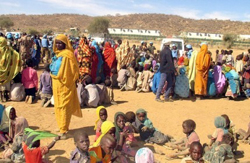
The backlash from leading humanitarian and development organizations continues over the European Union’s recent plan to work with Sudan and other repressive regimes to address irregular migration flows and stop refugees from reaching Europe. This plan would partner the EU with Sudan, despite Sudan President Omar al-Bashir’s outstanding International Criminal Court arrest warrants and the regime’s terrible human rights record, and Eritrea, where a 2016 United Nations Commission of Inquiry found that Eritrean government officials have committed crimes against humanity, including enslavement, rape, and torture, over the past 25 years.
On June 17, Médecins Sans Frontières (MSF) offered perhaps the most powerful rebuke of this plan by announcing that it would no longer accept money from EU member states. This decision could cost the organization around €60 million ($67.9 million), but MSF found that the harm this policy creates is not worth the financial benefit. As Jérôme Oberreit, MSF’s international secretary general, stated, “MSF will not receive funding from institutions and governments whose policies do so much harm.” MSF further condemned the EU plan to work with “dictators,” noting that this policy risks stranding refugees in precarious situations.
Earlier this month, Lee Crawfurd, a researcher for the Center for Global Development described the EU plan as “a strong contender for the worst aid project in the world.” Crawfurd criticizes the plan for its misguided approach, including “building detention camps for dictators,” which the EU planning document refers to innocuously as “reception centres.” More broadly, he notes that this plan attempts to reduce the number of people trying to reach Europe through two tactics: persuasion and force. Concluding that the persuasive tactic “is likely to be entirely counterproductive,” Crawfurd finds the pressure or force tactic is even worse. “[O]utsourcing our dirty work to some of the most brutal tyrants, should be beyond the pale for a people that so pride ourselves on our fundamental values of respect for human dignity and human rights.”
Sara Tesorieri, a policy adviser at Oxfam, makes a similar argument and cautions European leaders of sacrificing European values “on the altar of migration” by engaging with repressive regimes that it previously “held at arm’s length.” In addition to humanitarian and development organizations, some European Parliament members have also criticized this plan. For example, Italy’s Barbara Spinelli stated that the plan “would make us [Europe] complicit with dictatorships and deny basic fundamental rights to people fleeing wars, famine and extreme poverty . . . The commission should be ashamed of this proposal.”
Despite these obvious human rights concerns, European leaders plan to move forward with these efforts. In Sudan, this includes providing assistance to the National Intelligence and Security Services (NISS), an organization accused of committing numerous human rights abuses, including arbitrary arrest and detainment, torture, and sexual violence. NISS also oversees the Rapid Support Forces, which committed numerous abuses against internally displaced people (IDPs) in Darfur. According to a 2014 U.S. State Department report, armed groups including the RSF, “killed and injured civilians, raped women and children, looted properties, targeted IDP camps, and burned villages in South, East, and North Darfur.” The same report states that NISS controlled the RSF. That European leaders plan to provide NISS funding and support to address an issue as sensitive as migration and refugees is hugely problematic.
Médecins Sans Frontières’ decision to refuse significant funding when doing so would require a compromise of its core values is a powerful reminder that principles should matter more than money. Other humanitarian and development organizations should also take a stand against the EU’s plan to work with Sudan on irregular migration, refugees, and human trafficking. While the severity of the refugee and migration crisis calls for urgent action and multilateral cooperation, urgency cannot displace human rights. Nor should the urgency to act convince European leaders to trust some of the most repressive regimes to act as responsible partners.
Photo credit: Newly displaced persons in Sortoni, North Darfur, following clashes between rebel and government forces in Jebel Marra area, on 10 February 2016. UNAMID Photo.

